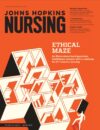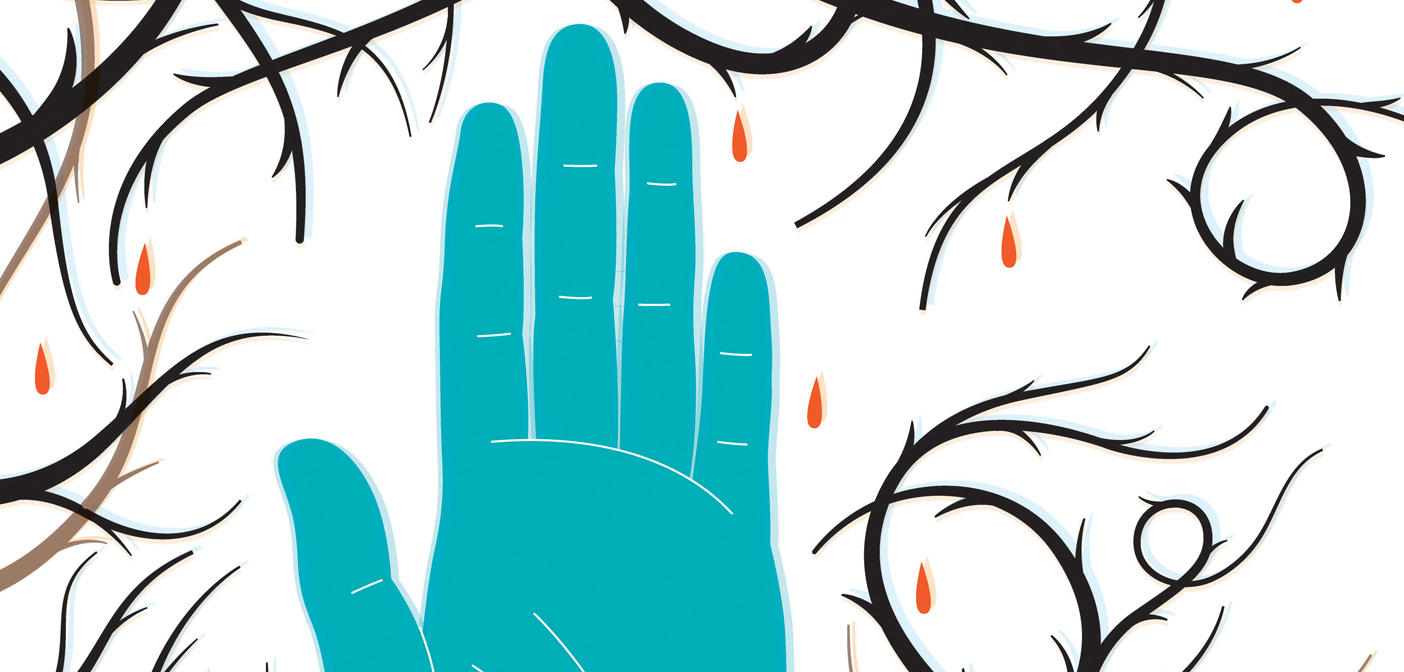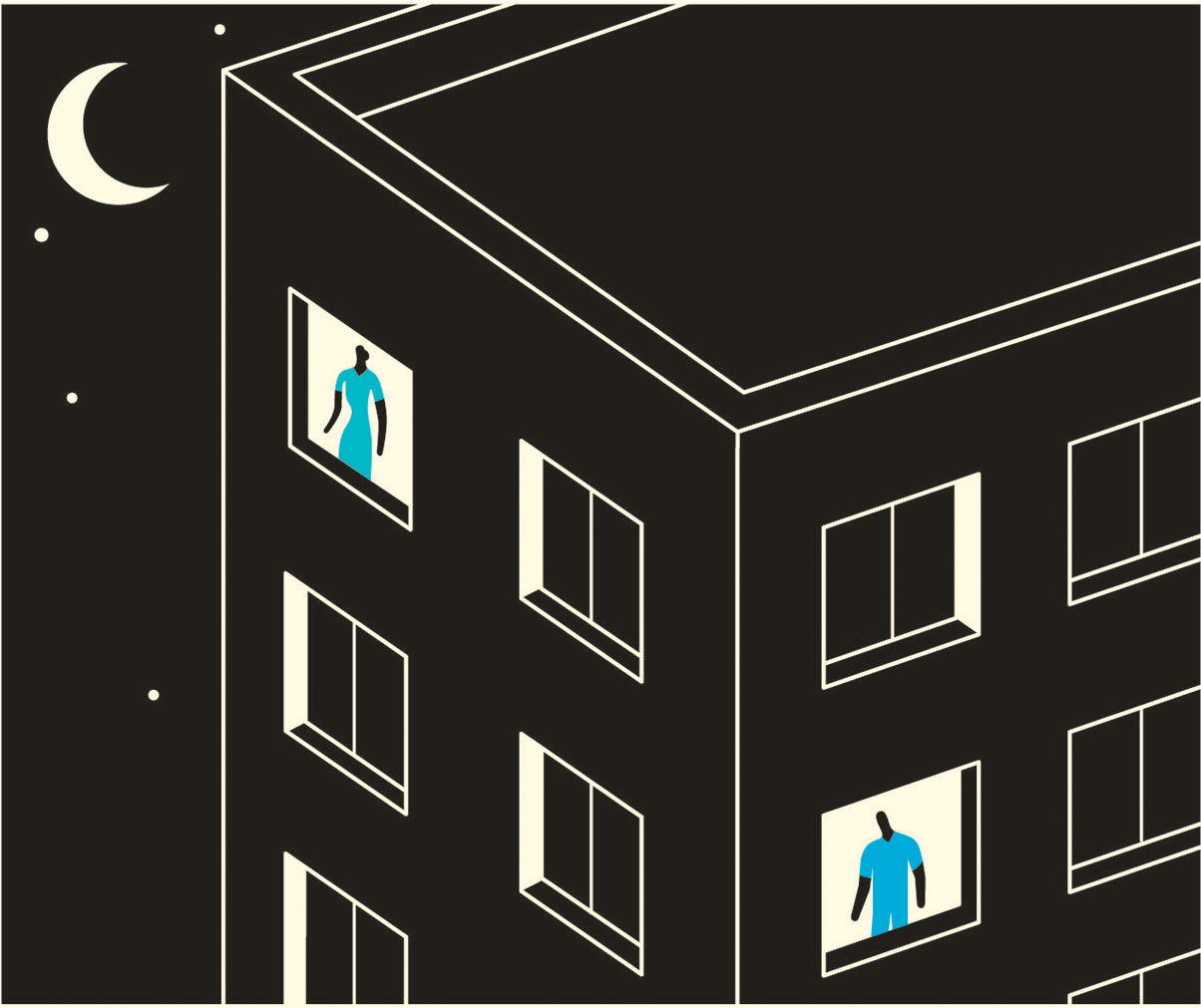On October 16, when a nurse from a Texas hospital took to the national media to decry unsafe conditions for workers exposed to the Ebola virus, the echoes carried all the way to Baltimore, to ethics Professor Cynda Hylton Rushton, PhD, RN, and, she hopes, to the student nurses making their way toward tomorrow’s front lines. There was what Dallas nurse Briana Aguirre asserted: that nurses had been left unprotected and unprepared to fulfill an ethical mandate to treat any patient, no matter the diagnosis. But perhaps most important was that Aguirre had the courage to “speak up and speak out,” says Rushton, Anne and George L. Bunting Professor of Clinical Ethics. While patient respect and safety are paramount, this is an obligation that nurses need to embrace more often since medical systems “don’t always support them to do the right thing” amid a swirl of technological demands, understaffing, an aging population with more complex chronic conditions, and pressures to make care more efficient and less costly.
That it took Ebola’s arrival in the United States to trigger such a moment is not lost on Rushton, founding member and core faculty of the Johns Hopkins Berman Institute of Bioethics. Nor was it a big surprise. How to deal with the fear, finger-pointing, and rush to judgment that all featured so prominently in Texas had already been put forward for discussion as Rushton gathered a team of national nurse leaders in Baltimore in August to debate these and other aspects of nursing ethics ahead of a push by the American Nurses Association (ANA) to revisit and clarify its own Code of Ethics, a framework for the conscientious caregiver. A report from that National Nursing Ethics Summit, the first of its kind, was released in November, but its diagnosis rang clear from the start. “We need to strengthen a culture that genuinely supports doing the right thing, at the right time, for the right reason,” Rushton explains.
The resulting Blueprint for 21st Century Nursing Ethics takes a hard look at how society and medical care have changed, and how front-line nurses, educators, researchers, policymakers, and hospital leaders must adapt “to support nurses to perform their roles in an ethical way.” Take patient involvement as one simple example, Rushton says. Nowadays, “we want patients to be heavily involved in their care, but the healthcare system simply wasn’t built for that.” Hopkins nurses have “cultivated the capacities for such give-and-take bedside care,” she says, but it can be a challenge to find an environment ready to embrace their skills.“For many reasons, the environments in which nurses work are changing rapidly, yet one core principle holds constant: nurses’ desire to serve their patients, families, and communities while fulfilling nursing values,” says the Blueprint for 21st Century Nursing Ethics. It seeks “organizational arrangements and work designs that enhance the practice of nursing and create for the next generation the chance to fulfill their desire to have meaningful careers in service to others.”
The report is a roadmap, and Rushton admits that there are miles to go before healthcare systems (and nurses) can sleep.
WHAT KEEPS NURSES UP AT NIGHT
Without fail, nurses join the profession to help heal the sick or injured. But ethical dilemmas on the job can create a chasm between nurse and patient, affect the level of care, and even drive frustrated caregivers from the field or to throw up their hands and “go along to get along.” These dilemmas can be as seemingly mundane as bean counting and as fraught as risking peer scorn and employment status by speaking up when patient care doesn’t measure up. There are disagreements with the course of care, measures that can cause patients to suffer even while ultimately healing them, pain management, a sharp increase in dementia cases, patients and families not fully informed of medical options, decisions to end life, respectfully caring for those with diverse backgrounds and rituals, workplace hierarchies or red tape, worker shortages, legal uncertainty, privacy rules, and fatigue. Or perhaps, in the case of Ebola, there is the notion of performing herculean tasks—at the risk of personal health—to resuscitate patients or to save their failing kidneys when death appears likely anyway.
THE EBOLA EFFECT
“Ever since Florence Nightingale took it upon herself to care for the sick and the wounded in the Crimean War in the 1850s, nurses have proven their value and their valor where care is most daunting and risky,” Dean Patricia M. Davidson, PhD, MEd, RN, wrote in an op-ed for the Baltimore Sun as first reports of nurse deaths from Ebola in West Africa reached the U.S. “We were never promised it would be easy, or safe. They didn’t tell us that because nurses don’t wait to be told. We are called, we act, and we save lives.”
Nevertheless, tacit in that caregiving pact is the understanding that such brave souls will be protected at all costs. “That nurses are infected as a result of an epidemic is not without historical precedent,” says Associate Professor Tener Goodwin Veenema, PhD, MPH, RN, pointing as just one instance to a SARS outbreak in 2003 in Canada that killed 44, with nurses among the victims. “That nurses are infected in 2014 due to this epidemic is completely unacceptable.”Veenema, an international expert on disaster preparedness and response, insists that Ebola should not have caught the U.S. off guard, and called the sudden rush to get hospitals across the U.S. ready too little too late, and predictably so. “It is completely unrealistic and unethical at this point in the outbreak to believe that all of ournation’s hospitals and 2.9 million nurses can instantaneously become prepared to handle this level of complex disease containment,” Veenema said after the Texas Ebola case was confirmed and health workers had been sickened. “Lofty and important as this goal may be, that ship sailed a long time ago when Congress cut funding to hospital and public health preparedness programs.”
“We were never promised it would be easy, or safe. They didn’t tell us that because nurses don’t wait to be told. We are called, we act, and we save lives.”– Dean Patricia M. Davidson, PhD, MEd, RN
Veenema, a 2013 Florence Nightingale Medal of Honor winner, says she favors elite teams of nurses and a limited number of hospitals to serve as outbreak centers. “Sadly, a cadre of properly educated nurses wearing appropriate-level personal protective equipment [PPE] could have established screening clinics, implemented a population-based triage model, rapid isolation of the sick, and quarantine of the exposed, and could have contributed to the early containment of this epidemic while it remained in Africa.”
A TRUSTWORTHY SYSTEM
Ebola is spread through contact with bodily fluids, the flows of which increase as a patient nears death. Droplets of saliva, vomit, diarrhea, and blood are bursting with the lethal virus, and one unsafe touch can mean infection. There is currently no known cure. Care provided by nurses requires education and training not just in the specificity of treatment, says Veenema, but in the crucial steps of “donning and doffing” PPE. Improper handling of the cumbersome gear after being in contact with Ebola patients or contaminated areas can lead to self-infection and death. Given the uncertainty, “nurses are understandably concerned about how to weigh their personal risks with their professional responsibilities,” says Rushton. “Embedded in these decisions are vexing ethical questions. What are the consequences if a staff member refuses [to treat a patient] infected with Ebola?”
“Nurses are understandably concerned about how to weigh their personal risks with their professional responsibilities. Embedded in these decisions are vexing ethical questions.”– Cyndia Hylton Rushton, PhD, RN
And despite the serve-any-and-all underpinnings of the profession, Rushton suggests that perhaps there are classes of nurses who, ethically, should be excused from treating Ebola patients: the pregnant, the inexperienced, and those with medical conditions that might leave them more susceptible. “How can we reassure front-line cliniciansthat the personal protection devices we have are adequate to protect their health? Is it justified to perform CPR on patients known to be carrying the Ebola virus? These are some of the ethical challenges that we must engage in to create a trustworthy system for both patients and clinicians,” Rushton explains. “While nurses must protect the welfare of their patients, they also have an obligation to identify unsafe working conditions that include insufficient training and equipment.” She adds, “Nurses do not have an ethical responsibility to be martyrs.”
FEAR AND LOATHING
In late October, Kaci Hickox, ’11, landed at a New Jersey airport, offered that she had been working with Doctors Without Borders to treat Ebola victims in Sierra Leone, and was immediately whisked against her will to quarantine though she had no Ebola symptoms and tested negative for the virus. Like Aguirre, Hickox spoke out from her isolation tent in New Jersey against an unfair quarantine policy built on ignorance and fear. She was released after public outcry against her treatment for service the White House called “deserving of praise and respect.” “This is not a situation I would wish on anyone, and I am scared for those who will follow me,” Hickox wrote in an essay she emailed from the quarantine tent to the Dallas Morning News. “I am scared that, like me, they will arrive and see a frenzy of disorganization, fear and, most frightening, quarantine.” Davidson applauded Hickox. “She epitomizes a Hopkins nurse. Kaci upheld the first provision of the American Nurses Association Code of Ethics by offering her services to those in need and delivered care with compassion and competence.” And she spoke up. Of the quarantine policy, Davidson said, “Fear has a way of constraining our capacity for respect and empathy. This should not be an excuse for disrespectful attitudes, procedures, or policies.”
Illustrations by Harry Campbell
AN ETHICAL ENVIRONMENT
As this magazine’s deadline passed, the world was still awaiting the containment and eradication of Ebola, at least for now, and waiting for the clock to start ticking toward the next big outbreak, or natural or manmade disaster. And Rushton and her fellow nursing ethics leaders were embracing a golden opportunity. Ebola has raised with force many of the issues that Rushton works daily to address as the co-chair of the Johns Hopkins Hospital Ethics Committee and Consultation Service, a teacher at the School of Nursing, and a leader of the Berman Institute of Bioethics.
Through the Blueprint for 21st Century Nursing Ethics, the ANA’s retooled ethics code, and continued interprofessional cooperation, Rushton hopes a truly ethical healthcare culture can be achieved. Here, Rushton says, ethical issues could be addressed openly, with courage and integrity. But how do you build a system that recognizes and overcomes the human tendency toward blame, shame, and a rush to judgment? “Self-awareness would be a good first step,” she says, adding that ethics must become a foundational element of all nursing curricula as they are at Hopkins. As the Blueprint explains, “At this time of rapid evolution, the need for action tempered with thoughtful discussion and analysis is urgent. Nursing needs to be effectively engaged, in order to assure that the solutions to our healthcare dilemmas represent the values of the profession and sustain nursing’s place in the interprofessional and public dialogue.”
For today, the U.S. healthcare industry and the world will have learned much from their handling of a frightening disease. By the time the next outbreak comes, of Ebola or something else, new policies for care of the stricken and the safety of the caregiver will very likely be in place. If not, Hopkins nurses still have their voices, and they won’t be afraid to use them–if Rushton, Veenema, and Davidson have anything to say about it.
To view the full Blueprint for 21st Century Nursing Ethic visit nursing.jhu.edu/EthicsReport To watch the video What Keeps Nurses Up At Night? Visit nursing.jhu.edu/UpAtNight




